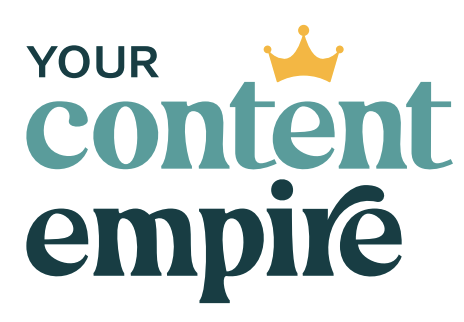In this post, we're covering how to build a 6-figure business by setting revenue goals and building a step-by-step plan to reach them using content.
Did you know that only 12% of women-owned businesses ever hit 6 figures? In a report commissioned by Amex, they found that while entrepreneurship is growing steadily among women, the percentage of those businesses hitting 6 figures or beyond lag behind those owned by men.
And I don’t know about you, but I find that kind of devastating. Women and women-identifying business owners give so much and I truly believe that we’re capable of anything when we have financial autonomy.
So even though the Instagram highlight reel might have you believing everyone is earning 6 figures already, just know that’s not the case. And that, we’ve got work to do if we’re going to change that statistic and empower more women with the financial autonomy needed to change the world.
As business owners avoiding talking about money is not something that we can afford to do. It’s exactly this—not talking about money that has contributed to a gender pay gap in almost every industry—including entrepreneurship.
Talking more about money in an honest and real way is our first step to addressing that gap and helping more women-owned businesses become profitable and their owners achieve financial autonomy.
There is a whole lotta fluff when it comes to income reports and talking about money as a clout-earning marketing tactic. So this video is not that.
We’re just gonna a real convo about money – goals, planning, earning more and using it for good.
At the core, my business mission is to help more women and women-identifying business owners, like you, build a 6-figure business – whatever the exact number is to you. Because I truly believe that money in your hands allows you to make a bigger impact, live a life that makes you and those around you happier and gives you more choices and freedom. All good and necessary things in my book.
But what does 6-figures mean? I know it’s a phrase that’s thrown around and that it’s become a sort of milestone in business to strive for.
My take is this: 6-figures can be $10,000, it can be $500,000 and more or less than that too. 6-figures to me is simply a term that represents your financial autonomy number, aka your freedom number. And it’s defined on a personal level. This is why our very first step in this process of getting you to your own version of 6-figures is to define what the heck that even means to you.
Step #1 – Choose Your Freedom Number (Aka Your Revenue Goal)
I see a lot hang-ups happen when it comes to picking a revenue goal number.
Is it realistic?
Is it not stretchy enough?
Am I just pulling this out of thin air?
Not to mention all of the shoulds, comparisonitis and shame that come along with this decision too.
So we’re bringing it back to you. Who cares what everyone else is making (or not making) – what is your number.
And there are a couple of ways to determine this for you:
Method 1: Reverse engineer your goal based on needs + wants + tax
- Start by making a list of all of the essentials you pay for in business
- Then make a list of all of the essentials you’re responsible for paying in your life
- Add these together and add a percentage for tax (usually 25% to 40% depending on where you are) to get your needs number
You could start with this as a goal if you’re not yet hitting it. Especially if you’re working a job at the same time as building a side hustle and want to eventually replace your income before going full-time.
But let’s also get an idea of your wants number too:
- Start by making a list of all the things you’d like to invest in your business and the cost of those things per month (maybe a VA, or a coach, or new tools or advertising)
- Then make a list of the things you want to invest personally too (maybe you want to move, take a vacation, start a savings account, get more childcare during the day) and what those things would average out to cost monthly
- Add these together and add a percentage for the tax to get your wants number
Finally – add your monthly needs plus wants number to get your ultimate revenue goal number. Are you making this already or do you need to work up to your needs and then wants number?
Method 2 is for those who are already making money in their businesses and have been at it for a least a few months already.
What was your annual revenue goal for last year?
Or what was your average revenue goal per month for the last few months?
Now pick a percentage to increase it by. Maybe you want to think conservatively at 10%? Or maybe you want to double it? Or 50% it?
Or a valid option, if you’re happy with the amount you’re making, is to hold steady. Maybe the goal is to maintain it.
Even if you choose method 2 to come up with your number, I still think it’s a good opportunity to check in with your wants and needs numbers and compare it to the amount you are currently bringing in.
So just to recap: Your action step is to pick your revenue number and claim it.
Step #2 – Create A Pathway To Reach Your Goal
So while it’s all well and good to know your revenue goal number, it doesn’t mean a whole lot unless we’re also pairing it with a plan to actually reach it.
This comes in 3 parts.
Part #1 – Make a list of your different offers and their price points.
Then create different mixes of how many of each offer you’d need to sell to reach your revenue goal.
Here’s an example:
- Let’s say I want to reach $100,000
- And I have 2 offers – 1 offer is my $5000 signature service and then I also have a course I sell for $500.
- I could sell 20 of my service packages alone to hit the goal.
- I could sell 200 of my course to hit it too.
- Or I could sell 12 of my service offers (1 per month) plus 80 of course.
Or any other potential mix.
The key to this step is to come up with a mix that you can believe in. Do you believe that it’s possible with your current offers and their prices to actually reach your goal? Because you have to believe it’s possible if it’s going to happen.
After all, the mind decides before the body arrives. Or the mind decides before the goal can arrive in this case.
And if you’re having trouble getting to belief, it might be time to revisit your offers or increase your prices so that you can have a belief-worthy plan to get you to that number.
Part #2 – Give your offers a home on your promo calendar.
Now, look at the year ahead of you (or what’s left of it). In order to hit your revenue goal, what and when are you going to sell?
Personally, I like to choose one offer per month to focus on with my content and marketing so that I can give all of my messaging a focus.
This is key because you can’t make sales if you’re never selling. And your efforts and message will be majorly diluted if you’re trying to sell everything at once.
But just because you’re focused on selling one offer, one month, that doesn't mean you won’t sell anything else, it just means that this is what you’re inviting people to during that month or timeframe.
Going back to my example of having a $5000 signature service package and a $500 course. Perhaps I look at my calendar and decide to alternate each month between promoting them. Or maybe I want to give my services the first two months of each quarter and then my course the final month.
Here’s the action step: Pull out a calendar and decide what you’ll sell and when.
Finally part 3 – For the sales period you have coming up next on your calendar: what do you need to create or do to promote that offer?
- What does that look like in terms of content or marketing?
- In terms of promotion?
- In terms of action steps?
Step #3 – Work Your Plan, Measure Your Plan, Repeat Your Plan
Finally, step #3 – Work your plan, then measure, tweak, repeat.
This is the messy bit but you're not going to get anywhere unless you actually take action. So embrace the mess. Chances are your plan is not 100% perfect. I certainly don't create 100% perfect promo plans. They all need constant measuring and tweaking.
- So take your action plan from the previous step and work the plan.
- Then once you’re finished, measure how well it worked.
- Think through 3 to 5 changes you’d make the next time.
- Incorporate those changes and run the plan again for this offer or another one.
If you do this process on a monthly basis, your chances of hitting your revenue goal (and ‘build a 6-figure business' goal) will be much higher.
Ready to Create a Revenue Plan that Helps You Build a 6-Figure Business?
Here's a quick recap of the steps to build a 6-figure business and revenue plan:
Step 1 – Choose Your Freedom Number (Aka Your Revenue Goal)
Step 2 – Create A Pathway To Reach Your Goal
Step 3 – Work Your Plan, Measure Your Plan, Repeat Your Plan
Ready to Learn the Perfect Content Strategy for Scaling to 6-Figures?
Get instant access to my E.A.S.E. Content Strategy Workshop where you'll learn the 4 content platforms and strategies to focus on to scale your results and sales from content. Plus you'll get my exclusive EASE Content Planning Spreadsheet for FREE ↓













